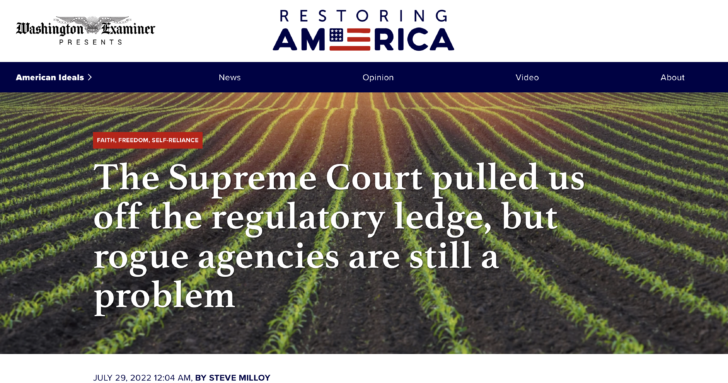My latest at the Washington Examiner.

As climate activists wail in the wake of the setback to their agenda recently delivered by the Supreme Court in its West Virginia v. EPA decision, the rest of us should be grateful that the costly and out-of-control federal bureaucracy can now be reined in earlier and more easily.
The court ruled the Obama administration’s EPA did not have the authority from Congress to issue its Clean Power Plan, a set of regulations essentially placing the EPA in charge of how electricity is generated in the United States. The court gave voice, for the first time, to the “Major Questions Doctrine,” under which federal agencies must have clear congressional authorization before issuing rules having major societal impacts.
It’s just too bad this doctrine and decision didn’t come seven years ago, when the Clean Power Plan was first issued. It was costly then, and we are still paying the price today for essentially illegal and unconstitutional regulation.
The Clean Power Plan was a key part of the Obama administration’s war on coal, the rest of which could also use a Supreme Court review under the “Major Questions Doctrine.” As such, it played a role in the destruction of about 50,000 high-paying coal industry jobs and tens of thousands of other support industry jobs, causing severe collateral damage to families, communities, state tax revenues, and the coal industry itself, most of which was forced into bankruptcy.
Only now do we learn this damage was caused by unlawful government agency activity. So, just where do all these unjustly harmed parties go to recoup their losses caused by a rogue government?
But don’t think that you aren’t also paying some price today because you weren’t in the coal industry then. You are, or soon will be, suffering in the pocketbook.
While the Obama EPA isn’t responsible for the global energy crisis, its illegal war on coal has made it worse. In response to the oil and gas crisis of the 1970s, Congress unleashed the coal industry to reduce the amount of oil and gas burned to generate electricity.
Thirty years later, and without any authorization from Congress, the EPA wrecked the coal industry, making us more reliant on natural gas to generate electricity and more vulnerable to a global natural gas crisis. Now, amid tighter natural gas supplies, businesses and consumers are paying more for electricity generated by natural gas as well as the heating and cooking done with natural gas.
Skyrocketing gasoline prices are fueling much of the inflation that is now at 40-year highs in the U.S. This, too, is a product of the out-of-control executive branch. President Joe Biden came into the White House promising an all-of-executive-branch approach to implementing the climate activist agenda. This policy suppressed and depressed oil production and sent gasoline prices through the roof. Where was the congressional authorization for any of these policies? There is none.
Gasoline prices are also high because over the last 40 years, the EPA has abused and exceeded its authority under the Clean Air Act to regulate oil refineries. The EPA has issued a never-ending stream of air quality standards that are pointlessly more stringent than what was permitted by Congress. These regulations have forced many refineries to shut down or consolidate. Other refineries have been Balkanized into geographically limited and inefficient blending boutiques.
None of this has anything to do with EPA’s congressional mandate in the Clean Air Act to ensure that it “protects the public health with an adequate margin of safety.”
The problem of unauthorized regulatory overreach is not confined to the EPA. With COVID, we experienced both the Centers for Disease Control and Prevention and the Occupational Safety and Health Administration exceed their congressional mandates with mask and vaccine mandates. The Securities and Exchange Commission is at this very moment attempting to rewrite the securities laws to give itself the authority to regulate corporations on climate.
And there is much more rogue bureaucratic activity out there.
In our system of government, the legislative branch is supposed to write the laws, while the executive branch implements them. If you want to change that, just get Congress to pass the needed legislation or amend the Constitution, a procedure that has been invoked successfully 33 times. That’s no guarantee we won’t get pointlessly expensive and ridiculous laws. But at least voters will have gotten what they voted for.
Steve Milloy is a senior policy fellow with the Energy and Environment Legal institute.
government overreach is the hallmark of any government. It’s also called mission creep. No bureaucracy can resist the temptation to garner more and more and more power to itself. This has been going on since FDR started it. I’m not sure how to roll so much of it back, but we need to start NOW.